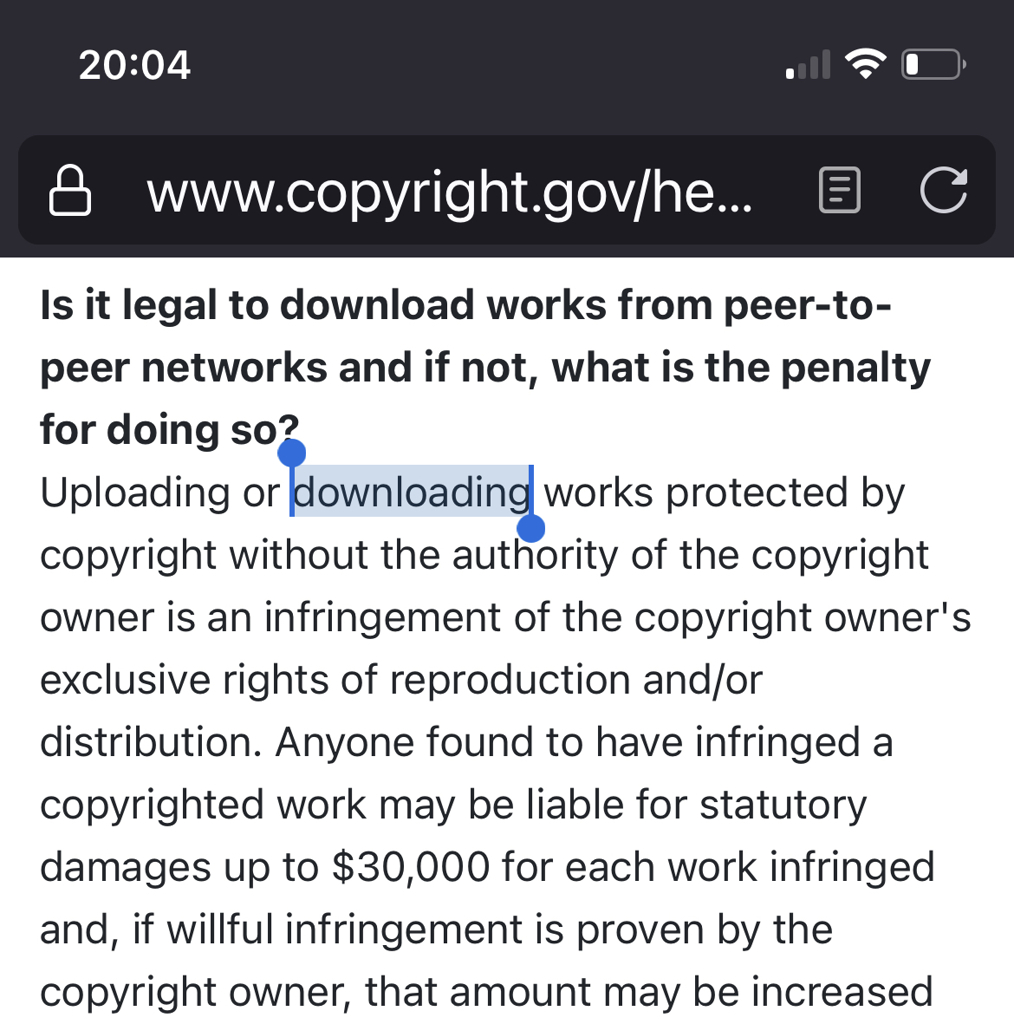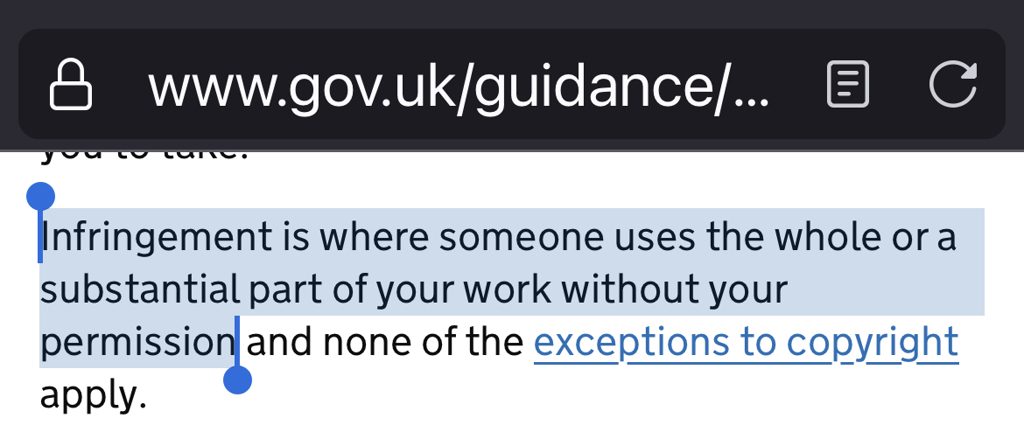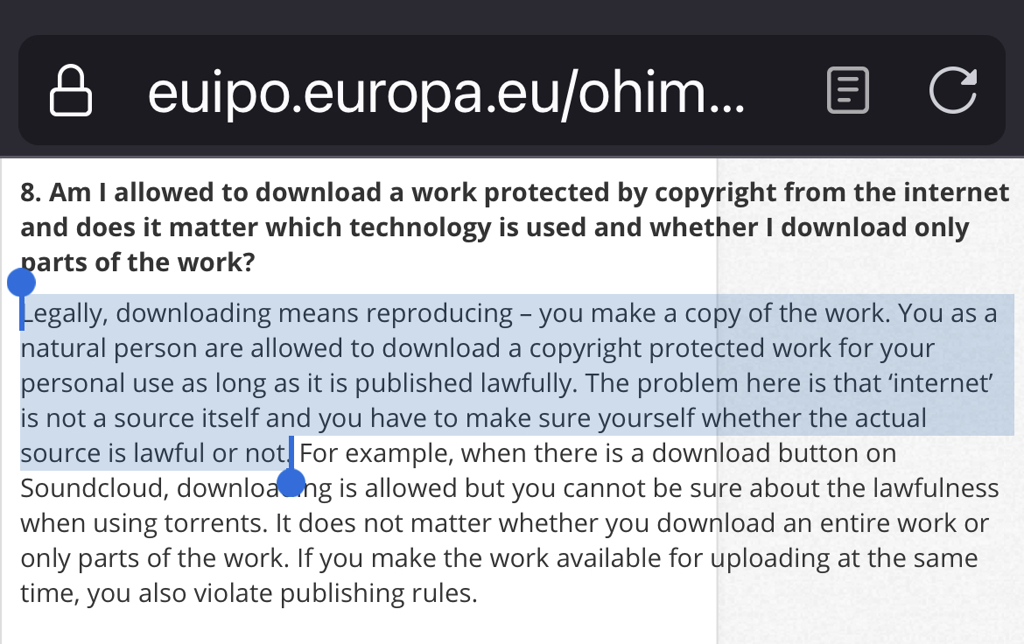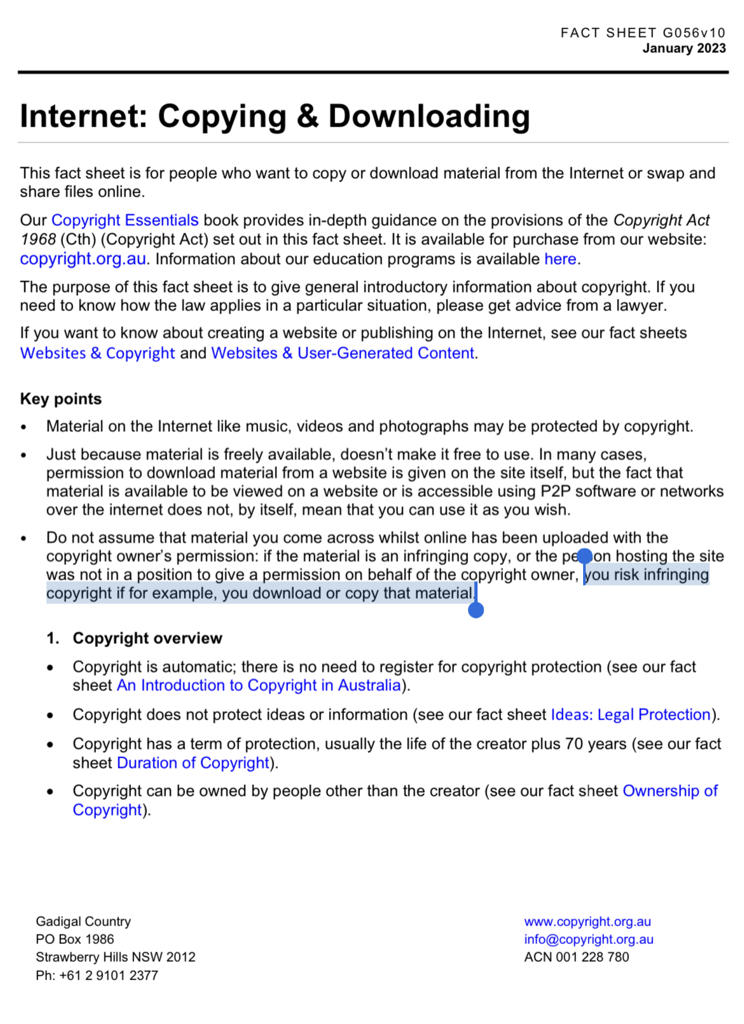If the AI “reads” the work first, then it would have needed to pay for it
That’s not actually true. Copyright applies to distribution, not consumption. You violate no law when I create an unauthorized copy of a work, and you read that copy. Copyright law prohibits you from distributing further copies, but it does not prohibit you from possessing the copy I provided you, nor are you prohibited from speaking about the copy you have acquired.
Unless the AI is regurgitating substantial parts of the original work, it’s output is a “transformative derivation”, which is not subject to the protections of the original copyright. The AI is doing what English teachers ask of every school-age child: create a book report.
Copyright applies to distribution, not consumption. You violate no law when I create an unauthorized copy of a work
This is completely untrue. Making any unauthorised copy is an infringement of copyright. Hell, the UK determined that merely loading a pirated game into RAM was unauthorised copying, making the act of playing a pirated game unlawful - thankfully this is ruling only the case in the UK, however the basic principles of copyright are the same all over the world.
When you buy something, you get a limited license to make copies for the purpose of viewing the material. That license does not extend to making backup copies. However, in a practical sense, it is very unlikely you will be prosecuted for most kinds of infringement like this - particularly when no money is involved. It’s still infringement, though.
Edit: I will say though: you violate no law when you view a copy I create. However I would still be infringing for making and showing you the copy.
In the case of making a book report, that is educational, and thus fair use. ChatGPT is not educational - you might use it for education, but ChatGPT’s use of copyrighted material is for commercial enterprise.
The uploader is the person creating the copy. Downloading is not creating a copy; downloading is receiving a copy.
I would love to see a citation on that UK precedent, but as you said: “thankfully this is only the case in the UK” and does not apply in the rest of the world.
Making any unauthorised copy is an infringement of copyright.
The exceptions to that are so numerous that the statement is closer to false than truth. “Fair Use” blows the absolute nature of that statement out of the water.
There has never been a successful prosecution for downloading only.
There was still copyright infringement because the company probably downloaded the text (which created another copy) and modified it (alteration is also protected by copyright) before using it as training data. If you write an original novel and admit that you had pirated a bunch of novels to use for reference, those novels were still downloaded illegally even if you’ve deleted them by now. The AI isn’t copyright infringement itself, it’s proof that copyright infringement has happened.
But personally I don’t think the actual laws will matter so much as which side has the better case for why they will lead to more innovation and growth for the economy.
There was still copyright infringement because the company probably downloaded the text (which created another copy)
Sure, someone likely infringed on copyright for that copy to be created, but the person/entity committing that infringement is the sender, not the receiver. The uploader is the infringing party, not the downloader.
If you write an original novel and admit that you had pirated a bunch of novels to use for reference, those novels were still downloaded illegally even if you’ve deleted them by now.
They were uploaded illegally. The people who distributed those copies to me have infringed on copyright, sure. My receiving those copies does not constitute infringement. Uploading is the illegal act, not downloading.
My work does not violate copyright, unless I use a substantial part of the other works. But, if I used substantial parts of those works, my work would be some sort of “derivation” and not the “original novel” you declared it. (Many types of derivation fall within “fair use” and do not constitute infringement.)
Whether I delete the works or not is entirely irrelevant. I am prohibited from creating and distributing additional copies, but I am not prohibited from receiving, possessing, or consuming an unauthorized copy.
The uploader is the infringing party, not the downloader.
an exclusive right of the copyright holder is the right to duplicate their work. downloading IS illegal because you’re creating an unauthorized duplicate of the work on your machine. your duplicate is distinct from the duplicate that someone else had created and uploaded. it’s just very hard to get caught downloading, and it’s not very cost effective for companies to pursue since they would only stop one person. that’s why most companies like the RIAA targeted torrents for their lawsuits, because they could easily see the ip addresses (which is why you should always use a vpn when torrenting) and because they could shut down uploaders. but downloading itself is still very illegal
My work does not violate copyright, unless I use a substantial part of the other works.
like I said, the AI is not a violation (probably, unless the courts later disagree), it’s proof that unauthorized duplication of copyrighted works has occurred, and that is illegal
You cannot create a copy of a work that you do not possess. The downloader does not possess the work to create a copy. Only the uploader is even capable of creating the copy. The downloader cannot create a copy; he can only request.
If he does something else with that copy he receives, he becomes something other than merely a downloader. That “something else” could be unlawful, but that “something else” is not “downloading”.
It could be unlawful if the downloader gains unauthorized access to the computer system, but that would not be a copyright violation. It could be unlawful if the downloader conspires with the uploader, but the degree of collaboration would have to be much greater to support a conspiracy charge.
Downloading does not meet the statutory criteria for copyright infringement. Downloading alone is not infringement.
That’s not actually true. Copyright applies to distribution, not consumption. You violate no law when I create an unauthorized copy of a work, and you read that copy. Copyright law prohibits you from distributing further copies, but it does not prohibit you from possessing the copy I provided you, nor are you prohibited from speaking about the copy you have acquired.
Unless the AI is regurgitating substantial parts of the original work, it’s output is a “transformative derivation”, which is not subject to the protections of the original copyright. The AI is doing what English teachers ask of every school-age child: create a book report.
This is completely untrue. Making any unauthorised copy is an infringement of copyright. Hell, the UK determined that merely loading a pirated game into RAM was unauthorised copying, making the act of playing a pirated game unlawful - thankfully this is ruling only the case in the UK, however the basic principles of copyright are the same all over the world.
When you buy something, you get a limited license to make copies for the purpose of viewing the material. That license does not extend to making backup copies. However, in a practical sense, it is very unlikely you will be prosecuted for most kinds of infringement like this - particularly when no money is involved. It’s still infringement, though.
Edit: I will say though: you violate no law when you view a copy I create. However I would still be infringing for making and showing you the copy.
In the case of making a book report, that is educational, and thus fair use. ChatGPT is not educational - you might use it for education, but ChatGPT’s use of copyrighted material is for commercial enterprise.
The uploader is the person creating the copy. Downloading is not creating a copy; downloading is receiving a copy.
I would love to see a citation on that UK precedent, but as you said: “thankfully this is only the case in the UK” and does not apply in the rest of the world.
The exceptions to that are so numerous that the statement is closer to false than truth. “Fair Use” blows the absolute nature of that statement out of the water.
There has never been a successful prosecution for downloading only.
There was still copyright infringement because the company probably downloaded the text (which created another copy) and modified it (alteration is also protected by copyright) before using it as training data. If you write an original novel and admit that you had pirated a bunch of novels to use for reference, those novels were still downloaded illegally even if you’ve deleted them by now. The AI isn’t copyright infringement itself, it’s proof that copyright infringement has happened.
But personally I don’t think the actual laws will matter so much as which side has the better case for why they will lead to more innovation and growth for the economy.
Sure, someone likely infringed on copyright for that copy to be created, but the person/entity committing that infringement is the sender, not the receiver. The uploader is the infringing party, not the downloader.
They were uploaded illegally. The people who distributed those copies to me have infringed on copyright, sure. My receiving those copies does not constitute infringement. Uploading is the illegal act, not downloading.
My work does not violate copyright, unless I use a substantial part of the other works. But, if I used substantial parts of those works, my work would be some sort of “derivation” and not the “original novel” you declared it. (Many types of derivation fall within “fair use” and do not constitute infringement.)
Whether I delete the works or not is entirely irrelevant. I am prohibited from creating and distributing additional copies, but I am not prohibited from receiving, possessing, or consuming an unauthorized copy.
an exclusive right of the copyright holder is the right to duplicate their work. downloading IS illegal because you’re creating an unauthorized duplicate of the work on your machine. your duplicate is distinct from the duplicate that someone else had created and uploaded. it’s just very hard to get caught downloading, and it’s not very cost effective for companies to pursue since they would only stop one person. that’s why most companies like the RIAA targeted torrents for their lawsuits, because they could easily see the ip addresses (which is why you should always use a vpn when torrenting) and because they could shut down uploaders. but downloading itself is still very illegal
like I said, the AI is not a violation (probably, unless the courts later disagree), it’s proof that unauthorized duplication of copyrighted works has occurred, and that is illegal
You cannot create a copy of a work that you do not possess. The downloader does not possess the work to create a copy. Only the uploader is even capable of creating the copy. The downloader cannot create a copy; he can only request.
If he does something else with that copy he receives, he becomes something other than merely a downloader. That “something else” could be unlawful, but that “something else” is not “downloading”.
It could be unlawful if the downloader gains unauthorized access to the computer system, but that would not be a copyright violation. It could be unlawful if the downloader conspires with the uploader, but the degree of collaboration would have to be much greater to support a conspiracy charge.
Downloading does not meet the statutory criteria for copyright infringement. Downloading alone is not infringement.
US
UK
EU
Australia cuz why the hell not
The “You wouldn’t steal a car” anti-piracy ad is coming to mind lol
They get people torrenting movies by saying you seed while you leach…
So if they torrented them in mass, they broke it.